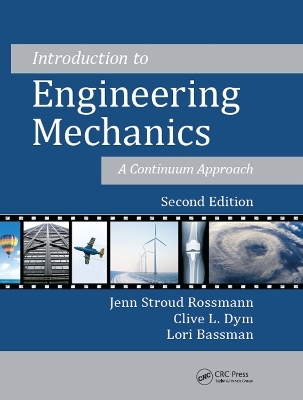
Introduction to Engineering Mechanics
Crc Press Inc (Verlag)
978-1-4822-1948-7 (ISBN)
Introduction to Engineering Mechanics: A Continuum Approach, Second Edition uses continuum mechanics to showcase the connections between engineering structure and design and between solids and fluids and helps readers learn how to predict the effects of forces, stresses, and strains. The authors’ "continuum checklist" provides a framework for a wide variety of problems in solid and fluid mechanics. The essence of continuum mechanics, the internal response of materials to external loading, is often obscured by the complex mathematics of its formulation. By gradually building the formulations from one-dimensional to two- and three-dimensional, the authors help students develop a physical intuition for solid and fluid behavior and for the very interesting behavior of those materials including many biomaterials, between these extremes. This text is an accessible first introduction to the mechanics of all engineering materials, and incorporates a wide range of case studies highlighting the relevance of the technical content in societal, historical, ethical, and global contexts. It also offers a useful perspective for engineers concerned with biomedical, civil, chemical, mechanical, or other applications.
New in the Second Edition:
The latest edition contains significantly more examples, problems, and case studies than the first edition.
The 22 chapters in this text:
Define and present the template for the continuum approach
Introduce strain and stress in one dimension, develop a constitutive law, and apply these concepts to the simple case of an axially loaded bar
Extend the concepts to higher dimensions by introducing the Poisson’s ratio and strain and stress tensors
Apply the continuum sense of solid mechanics to problems including torsion, pressure vessels, beams, and columns
Make connections between solid and fluid mechanics, introducing properties of fluids and strain rate tensor
Address fluid statics
Consider applications in fluid mechanics
Develop the governing equations in both control volume and differential forms
Emphasize real-world design applications
Introduction to Engineering Mechanics: A Continuum Approach, Second Edition provides a thorough understanding of how materials respond to loading: how solids deform and incur stress and how fluids flow. It introduces the fundamentals of solid and fluid mechanics, illustrates the mathematical connections between these fields, and emphasizes their diverse real-life applications. The authors also provide historical context for the ideas they describe and offer hints for future use.
Jenn Stroud Rossmann is an associate professor of mechanical engineering at Lafayette College. She earned her BS and PhD from the University of California, Berkeley. Her research interests include the study of blood flow in vessels affected by atherosclerosis and aneurysms. She has a strong commitment to teaching engineering methods and values to non-engineers, and she has developed several courses and workshops for liberal arts majors. Clive L. Dym served as Fletcher Jones Professor of Engineering Design for 21 years, and is now professor emeritus of engineering, at Harvey Mudd College. He earned his BS from Cooper Union and his PhD from Stanford University. His primary interests are in engineering design and structural mechanics. He is the author of 18 books and has edited 11 others, including Analytical Estimates of Structural Behavior (with Harry Williams), CRC Press, 2012. Among his awards are the Merryfield Design Award (ASEE, 2002), the Spira Outstanding Design Educator Award (ASME, 2004), and the Gordon Prize (NAE, 2012). Lori Bassman is a professor of engineering and director of the Laspa Fellowship Program in applied mechanics at Harvey Mudd College. She earned her BSE at Princeton University and her PhD at Stanford. Through a visiting appointment at the University of New South Wales in Australia, she pursues her research in physical metallurgy, and her other research interests include computational modeling of bird flight biomechanics.
Introduction. Strain and Stress in One Dimension. Case Study 1: Collapse of the Kansas City Hyatt Regency Walkways. Strain and Stress in Higher Dimensions. Applying Strain and Stress in Multiple Dimensions. Case Study 2: Pressure Vessels. Beams. Case Study 3: Physiological Levers and Repairs. Beam Deflections. Case Study 4: Truss-Braced Airplane Wings. Instability: Column Buckling. Case Study 5: Hartford Civic Arena. Connecting Solid and Fluid Mechanics. Case Study 6 : Mechanics of Biomaterials. Case Study 7: Engineered Composite Materials. Fluid Statics. Case Study 8: St. Francis Dam. Fluid Dynamics: Governing Equations. Case Study 9: China’s Three Gorges Dam. Fluid Dynamics: Applications. Case Study 10: Living with Water, and the Role of Technological Culture. Solid Dynamics: Governing Equations. References. Appendices. Index.
| Zusatzinfo | 16 Tables, black and white; 444 Illustrations, black and white |
|---|---|
| Verlagsort | Bosa Roca |
| Sprache | englisch |
| Maße | 178 x 254 mm |
| Gewicht | 1043 g |
| Themenwelt | Medizin / Pharmazie |
| Naturwissenschaften ► Physik / Astronomie ► Mechanik | |
| Technik ► Bauwesen | |
| Technik ► Maschinenbau | |
| ISBN-10 | 1-4822-1948-4 / 1482219484 |
| ISBN-13 | 978-1-4822-1948-7 / 9781482219487 |
| Zustand | Neuware |
| Haben Sie eine Frage zum Produkt? |
aus dem Bereich


